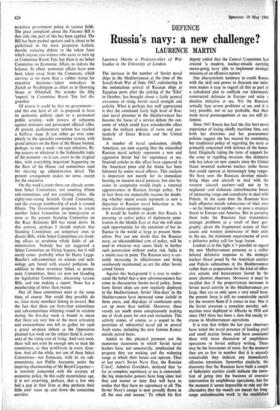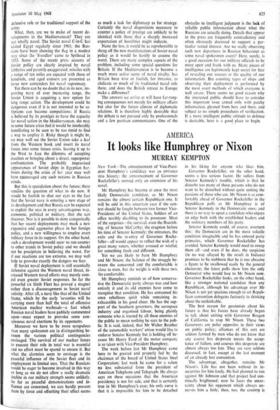Russia's navy: a new challenge?
DEFENCE LAURENCE MARTIN
The increase in the number of Soviet naval missions of an offensive nature.'
become the focus of a service debate the out- fensive.
navy, an old-established arm of policy, will be a defensive policy call for large forces.
activity comes, of course, as a sequel to the crease in Mediterranean operations. ocean-going navy able to implement strategic A number of naval spokesmen, chiefly her traditional policy of regarding the navy as It would be foolish to doubt that Russia is threat to Europe and America. But in pursuing Against this background it is easy to under- sive actions and harassments feared by the defensive role or for traditional support of the army.
What, then, are we to make of recent de- velopments in the Mediterranean? They are not wholly novel. The Soviet naval C-in-C has visited Egypt regularly since 1961; the Rus- sians have' been showing the flag in a modest way since the `Sverdloy' came to Spithead in 1953. Some of the recent press acounts of Soviet policy are clearly inspired by naval lobbyists and patently exaggerated; missiles with a range of ten miles are equated with those of hundreds, and aged cruisers are presented as fierce new contenders for naval supremacy.
Yet there can be no doubt that in its new, im- proving navy of ever increasing range, the Soviet Union is acquiring a new option for long range action: The development could be dangerous even if it is not intended to be so. Options can become compulsions; if Russia is believed by its protégés to have the capacity for naval action in the Mediterranean, she may in some future crisis feel it would be intolerably humiliating to be seen to be too timid to find a way to employ it. Risky though it might be, we may well see the Soviet Union take a leaf from the Western book and insert its naval forces into some future crisis, leaving it up to the West to face the dilemma of accepting inaction or bringing about a direct, superpower confrontation. The probably improvised appearances of Soviet ships in Egyptian har- bours during the crisis of las year may well have encouraged any such notions in Russian minds.
But this is speculation about the future; there 0 remians the question of what to do now. It would be foolish to shut our eyes to the fact that the Soviet navy is entering a new stage of its development and that Russia can be expected to exploit the seas in every advantageous way, economic, political or military, that she can discover. Nor is it possible to deny categorically that her recent deployments may mark a new expansive and aggressive phase in her foreign policy, and a new willingness to employ overt military force in its support. On the other hand, such a development would seem to run counter to other trends in Soviet policy and we should not be precipitate in believing the worst. For if our reactions are too extreme, we may well help to provoke exactly the dangers we fear.
If Soviet naval deployment is still essentially defensive against the Western naval threat, in- creased Western naval efforts may merely com- pel even greater Soviet responses. So far the powerful us Sixth Fleet has proved a magnet rather than a discouragement to Soviet naval activity. After all, a navy like that of the United States, which by the early 'seventies will be carrying more than half the total of offensive American nuclear warheads—a fact which Russian naval leaders have publicly commented upon—must expect to provoke some con- spicuous naval exertions by its opponents.
Moreover we have to be more scrupulous than many spokesmen are in distinguishing be- tween the various political contingencies envisaged. The survival of our nuclear forces to execute their role in total war is essential and no effort must be spared to ensure it. But what the alarmists seem to envisage is the peaceful influence of the Soviet fleet and its employment in limited uses. That the Russians would be eager to become involved in this way so long as we do not allow a really dramatic decline in our military strength seems unlikely. So far as peaceful demonstrations and in- fluence are concerned, we can hardly prevent them by force and offsetting their' effect seems
as much a task for diplomacy as for strategy. Certainly the naval dispositions necessary to counter a policy of prestige are unlikely to be identical with those that a sharply increased expectation of hostilities might indicate.
None the less, it would be as reprehensible to shrug off the new manifestations of Soviet naval policy as it would be hastily to assume the worst. There are many complex aspects of the problem, including some special questions for Britain. If the Mediterranean is to become a much more active scene of naval rivalry, has Britain been wise or foolish, for instance, to abdicate so much of its traditional naval role there, and does the British retreat to Europe make a difference?
The answers we arrive at will have far-rang- ing consequences not merely foi military affairs but also for the future climate of diplomatic relations. It is therefore highly desirable that the debate is not pursued only by professionals and a few partisan commentators. One of the
obstacles to intelligent judgment is the lack of reliable public information about what the Russians are actually doing. Details that appear in the press are frequently contradictory and often obviously doctored to support a par- ticular vested interest. Are we really observing such new departures in Russian behaviour as some naval spokesmen assert? Here, surely, is a good occasion for our military officials to be more open and frank with us. Many pieces of intelligence are legitimately kept secret for fear of revealing our sources or the quality of our information. But counting types of ships and observing their deployment is performed by the most overt methods of which everyone is well aware. There seems no good reason why the interested public should have to consider this important issue armed only with patchy information, gleaned from herc and there, and subject to no simple procedures of verification. If a more intelligent public attitude to defence is desirable, here is a good place to begin.







































 Previous page
Previous page